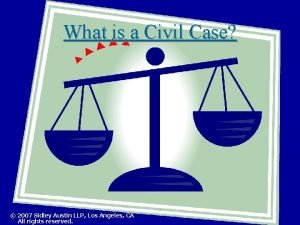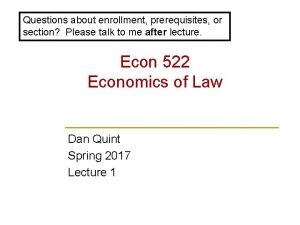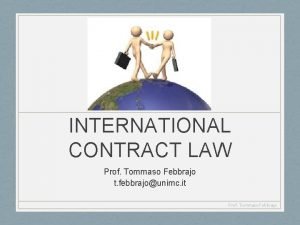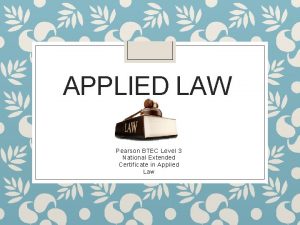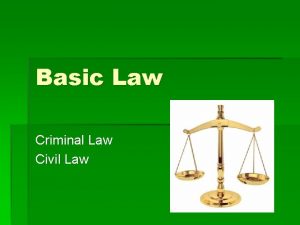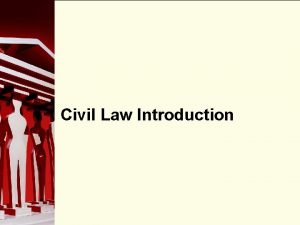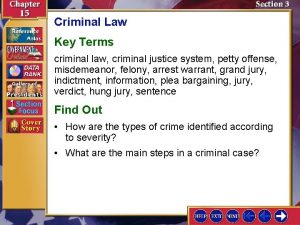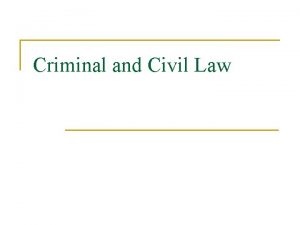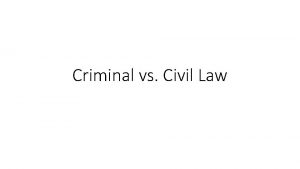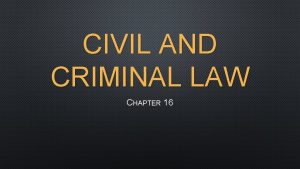Criminal Law Criminal vs Civil Law Criminal law












- Slides: 12

Criminal Law

Criminal vs. Civil Law Criminal law deals with illegal acts committed against society If someone commits a crime against society they are charged by the Crown (R. or Regina/Rex) & tried in criminal court If found guilty in criminal court one is punished by the Crown, but do not have to compensate the victim of the crime

Criminal v. Civil Law Cont… Civil law deals with illegal acts committed against an individual Here, the appellant sues the respondent for compensation (usually money). No jail time or state punishment can be given in a civil case However, one can be charged with a criminal offense and then sued for damages in civil court i. e. a you can serve jail time for theft (criminal) and then have to pay for what you stole (civil)

The Purpose of Criminal Law Criminal law exists to protect society, which it does in a number of ways: 1. Helps deter people from committing crimes 2. Punishes those who commit crimes 3. Imprisons those dangerous to society

The Criminal Code of Canada is the set of books that contains the laws of the land It can only be changed by the federal government so that laws are the same throughout the country It lays out the offenses that are considered crimes and the punishments set out for them It is constantly being changed and amended to reflect changes in society Changed by Parliament, interpreted by the judiciary

Change Over Time: The Criminal Code has changed a lot over the years. These are some excerpts from the original from 1867: "If a sentence of death is passed upon any woman, she may move in arrest of execution on the ground that she is pregnant. If upon the report of (medical practitioners), it appears to the court that she is so with child, execution shall be arrested until she is delivered of a child, or until it is no longer possible in the course of nature that she be so delivered. " "Whenever whipping may be awarded for any offence. . . the number of strokes shall be specified in the sentence and the instrument to be used for whipping shall be a cat-o'-nine-tails unless some instrument is specified in the sentence. Whipping shall not be inflicted on any female. " "In all cases where an offender is sentenced to death, the sentence shall be that he be hanged by the neck until he is dead. "

WHAT IS A CRIME?

What is a Crime? For an act to be considered criminal, it must meet four criteria: It must harm other people It must violate society’s basic values Dealing with it must not violate society’s basic values The law can make a significant contribution to resolving the problem

Elements of a Crime A act must have two components to be considered a crime: 1. Actus Reus: Latin for “guilty act” -It is the physical element of committing a crime -May be accomplished by an action, threat of action or by an omission to act 2. Mens Rea: Latin for “guilty mind” -Mens Rea exists if the offence is committed with: a) intent or knowledge b) recklessness Mens Rea + Actus Reus = A Crime

What is a Crime? When the Crown is trying to prove someone’s guilt, they must prove both actus reus and mens rea beyond a reasonable doubt If there is a reasonable doubt as to either or both of these things the judge or jury must acquit the accused and set them free

Additional Key Terms General Intent: -Intent is limited to the act itself and the person has no other criminal purpose in mind. Specific Intent: -Exists when the person committing the offence has further criminal purpose in mind. Example: Break and Enter with further intent to rob

Additional Key Terms & Parties to an Offence Cont. . . Motive (vs. Intent) Attempt Conspiracy Recklessness Aiding Abetting Accessory after the fact
 What is a civil law
What is a civil law Difference between civil law and criminal law
Difference between civil law and criminal law Difference between civil and criminal law table
Difference between civil and criminal law table Difference between civil and criminal law table
Difference between civil and criminal law table Civil rights and civil liberties webquest
Civil rights and civil liberties webquest Criminal cases vs civil cases
Criminal cases vs civil cases Common law and civil law
Common law and civil law Common law and civil law
Common law and civil law Common law and civil law
Common law and civil law Chapter 21 civil rights equal justice under law
Chapter 21 civil rights equal justice under law 1453-395
1453-395 Pearson applied law past papers
Pearson applied law past papers Civil law notary florida
Civil law notary florida





